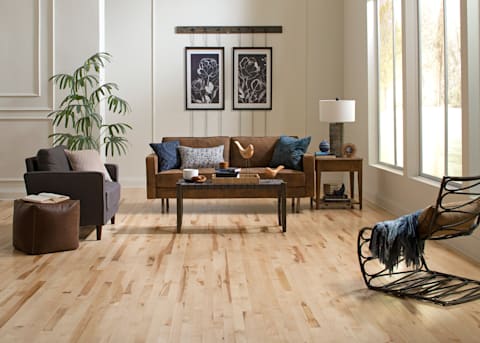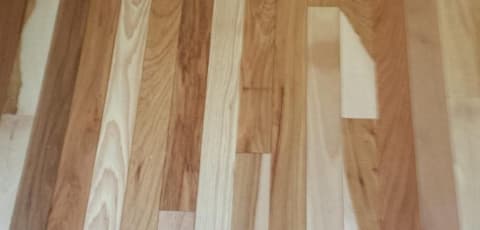- Home
- Education
- Flooring Basics
- What Is the Best Thickness for Hardwood Flooring?
What Is the Best Thickness for Hardwood Flooring?
Hardwood flooring comes in a variety of different thicknesses. Learn about your options and find the best flooring for your home at LL Flooring.
You're ready to add wood flooring to your home, but perhaps you've reached a level of decision fatigue. After all, you have to choose whether solid hardwood or engineered hardwood is right for you. Then, you have to settle on a finish, texture, sheen, and width you love. Plus, you might wonder, "What is the best thickness for engineered wood flooring?" Stop getting bogged down in the details because we're here to help. Let's learn more about flooring thickness to help you identify the best option for your home.
Flooring Thickness: The Basics
Before you decide what thickness of engineered wood floor is best, it's important to understand just what flooring thickness means. Usually, it refers to the overall thickness of the whole board—whether that's comprised of many layers or just one. At LL Flooring, you can find solid hardwood floors with a 3/4-inch thickness, for example. Engineered flooring ranges from 5/16 inches to 3/4 inches in thickness.
However, both solid hardwood and engineered hardwood floors are finished with a protective finish on top of the board.

Assessing Engineered Hardwood Flooring Thickness
Good news: There isn't a single best thickness for engineered wood flooring. Instead, your goal is to find a hardwood flooring thickness that's best for your space, installation requirements, and budget. So, where do you begin? Consider these factors as you choose the right flooring for your needs:
- Stability of your subfloor: A thicker board can help enhance the overall stability of your flooring.
- Radiant heating systems: Thick boards may impact the effectiveness of a radiant heating system. In addition to other factors, consider opting for a thinner board if you plan to install a radiant heating system underneath your flooring. Consult your Warranty, Installation, and Care guide for more information.
- Foot traffic: Installing this flooring in a busy space with lots of activity? For solid wood floors, consider a protective finish and wood species with a higher rating on the Janka hardness scale. With engineered flooring, you could go with a thicker board, yet sometimes a thinner board can perform better due to core construction and veneer that can better withstand scratches and dents. If you're choosing to floor a less frequented room, a thinner board or one without a high-performance veneer will work well.
Finding the Right Hardwood Flooring Thickness for You
When comparing engineered flooring thickness, shop with your space in mind. Ultimately, your goal is to find the best flooring for your home, which might differ from the best flooring for your neighbor's home. Ready to explore everything that LL Flooring has to offer? Try our Picture It! Floor Visualizer to envision different types of flooring in your home and find one you love.
Follow LL Style on Instagram & Pinterest
ALSO, do you learn about home improvement and design with fun and informative videos? Subscribe to the LL Flooring YouTube Channel to learn more, leave comments or ideas that helped you, and join the community!
In this video, contractor and home improvement television host Josh Temple gives some little-known insight about the importance of acclimating new flooring before installation. Check it out and learn!


